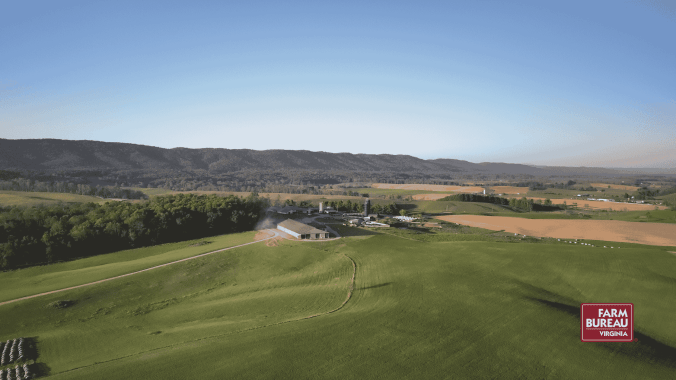A quick look at this week’s General Assembly highlights:
- Agriculture
- Data Centers
- Game
- Invasive Species/Noxious Weeds
- Solar
- Other Issues
Reminder: Legislative Day is Feb. 8–9! Stay safe, stay warm and stay tuned for more updates!
A quick look at this week’s General Assembly highlights:
Reminder: Legislative Day is Feb. 8–9! Stay safe, stay warm and stay tuned for more updates!
A quick look at this week’s General Assembly highlights: progress on truth-in-meat labeling, mixed outcomes on farmworker wage policies, a win for local invasive‑species control, and a weather‑related shift of Legislative Day to Feb. 8–9. Stay safe, stay warm and stay tuned for more updates!

As Virginia prepares for significant winter weather—expected to include snow, ice, and freezing rain—the Commonwealth has activated an emergency transportation waiver to support rapid response and recovery. Effective January 22, 2026, through February 5, 2026, the Virginia Department of Motor Vehicles (DMV) has authorized a temporary suspension of certain transportation regulations for carriers engaged in winter storm relief efforts.
This emergency order is designed to help move critical supplies and services quickly and safely across the state as severe weather threatens to impact infrastructure, utilities, and essential community needs.
This action follows the Governor’s State of Emergency (EO‑11), issued in anticipation of the winter storm expected to significantly affect Virginia—particularly on January 24–25, 2026. By loosening specific transport restrictions, the Commonwealth aims to ensure that emergency crews, utility service providers, and supply carriers can reach affected areas without unnecessary delays.
January 22, 2026 – February 5, 2026
The waiver is active for the duration of direct emergency assistance or 30 days, whichever is shorter.
Carriers providing direct assistance in winter storm response, including:
Carriers participating in emergency relief operations receive a temporary waiver of certain registration and licensing requirements.
To accelerate transport of heavy and oversized equipment, Virginia is easing some size and weight restrictions on VDOT‑controlled roads, including:
Important: These weight exemptions do not apply to posted bridges or structures.
The order activates FMCSA Section 390.23, which provides relief from federal hours‑of‑service regulations during emergencies. This allows drivers supporting storm response to operate with expanded flexibility, coordinated through the Virginia Department of Emergency Management (VDEM).
Even with the emergency flexibility, certain restrictions remain in place to protect public safety and infrastructure:
Emergency transportation waivers like this one play a critical role in ensuring that help arrives where it’s needed most—especially when hazardous weather threatens essential infrastructure and community services. By temporarily suspending certain administrative and operational barriers, Virginia is equipping disaster-response teams and partner organizations with the flexibility needed to act quickly and efficiently.
As winter weather unfolds, carriers participating in relief efforts should stay informed of any updates from the Virginia DMV, VDEM, and state officials regarding travel conditions, safety requirements, and changes to emergency declarations.
The 2026 General Assembly session is underway! Virginia Farm Bureau’s Government Relations team is tracking the top issues that matter most to our members, and we’ll be bringing you weekly updates right here. 👉 Tune in each week to stay informed on the top priorities we’re working on for Virginia agriculture.
The USDA has released per-acre payment rates for the Farmer Bridge Assistance (FBA) Program. Eligible producers will receive pre-filled applications and payments by February 28, 2026.
| Commodity | Rate per Acre |
|---|---|
| Rice | $132.89 |
| Cotton | $117.35 |
| Oats | $81.75 |
| Peanuts | $55.65 |
| Sorghum | $48.11 |
| Corn | $44.36 |
| Wheat | $39.35 |
| Chickpeas (Small) | $33.36 |
| Soybeans | $30.88 |
| Chickpeas (Large) | $26.46 |
| Safflower | $24.86 |
| Lentils | $23.98 |
| Canola | $23.57 |
| Mustard | $23.21 |
| Barley | $20.51 |
| Peas | $19.60 |
| Sunflower | $17.32 |
| Sesame | $13.68 |
| Flax | $8.05 |
Eligible Acres:
Eligible Uses:
Crop Insurance:
The remaining $1 billion is reserved for specialty crops and sugar producers. Payment timelines are still under development.
📧 Questions: farmerbridge@usda.gov
🌐 Program Information: https://www.fsa.usda.gov/fba
📍 Local Support: Contact your USDA FSA county office

Robert Harper with Virginia Farm Bureau’s grain division provides this week’s market updates.
#merchandiserminute #grainfuture #virginiafarmbureau

The USDA will provide $12 billion in one-time bridge payments to American farmers facing market disruptions and elevated production costs.
The Farmer Bridge Assistance (FBA) Program will distribute up to $11 billion to row crop producers of barley, chickpeas, corn, cotton, lentils, oats, peanuts, rice, soybeans, wheat, and other covered commodities. Payments are expected by February 28, 2026.
Action Required: Farmers must ensure their 2025 acreage reporting is accurate by 5 p.m. ET on December 19, 2025. Commodity-specific payment rates will be released by month’s end.
The remaining $1 billion is reserved for specialty crops and sugar, with details still under development.
This bridge program comes on top of over $30 billion in disaster and economic assistance already delivered in 2025, including:
These payments are designed to support farmers until the benefits of the One Big Beautiful Bill Act take effect in October 2026, which raises reference prices for major commodities by 10-21%.
The administration has secured trade agreements with more than 15 countries, opening new markets for American agricultural products:
The Trump Administration has also:
Producers can submit questions or request meetings by emailing farmerbridge@usda.gov.

Robert Harper with Virginia Farm Bureau’s grain division provides this week’s market updates.
#merchandiserminute #grainfuture #virginiafarmbureau

EPA and the Army Corps have released a new proposed rule defining “waters of the United States” in response to the Supreme Court’s Sackett v. EPA decision. The rule was officially published in the Federal Register on Nov. 20, 2025, and the agencies are now accepting public comments.
This proposal begins to align the federal definition of WOTUS with the clarity that the Supreme Court required. It provides meaning to key terms like “relatively permanent” and “continuous surface connection,” which dictate the scope of the federal government’s jurisdictional reach under WOTUS. These changes matter. Farmers and ranchers need a clear, workable rule that protects clean water and respects private property and state authority.
We need your help: EPA and the Corps will only take comments for 45 days, and it is important that farmers and ranchers are heard. Sharing your story and asking the agencies to finalize a clear and durable rule will make a difference.
Take action: Use the link below to submit your comment. A draft comment is provided on the action page, and you can personalize it if you choose.
Deadline: Comments must be submitted by Jan. 5, 2026.
Thank you for speaking up and helping ensure these agencies adopt a rule that provides the clarity you need to protect your land and water.

Robert Harper with Virginia Farm Bureau’s grain division provides this week’s market updates.
#merchandiserminute #grainfuture #virginiafarmbureau